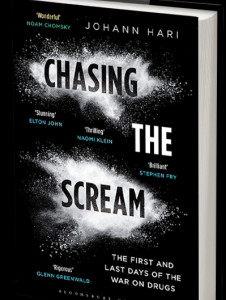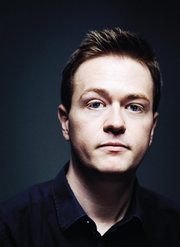I had read about a third of Johann Hari’s powerful book, Chasing the Scream: The First and Last Days of the War on Drugs, in quick snatches during my weeks of travel. I’d seen his TED talk and read reviews in the press. He’s the guy who traveled the world uncovering the damage done by the War on Drugs. He’s the poster child of decriminalization – and perhaps legalization. I liked his book a lot, and I kept looking forward to spending more time with it.
 Hari is a journalist by profession, and he writes in stirring detail about the victims of the draconian punishments handed down by court systems all over the world, intended to stamp out the scourge of addiction. He writes about the mayhem and murder that keep sprouting up in the footprints of drug prohibition – resulting not from drugs but from the clashes of criminal gangs. And he writes about the feelings and beliefs of those who’ve supported, enforced, and legitimized anti-drug policies for compelling personal reasons.
Hari is a journalist by profession, and he writes in stirring detail about the victims of the draconian punishments handed down by court systems all over the world, intended to stamp out the scourge of addiction. He writes about the mayhem and murder that keep sprouting up in the footprints of drug prohibition – resulting not from drugs but from the clashes of criminal gangs. And he writes about the feelings and beliefs of those who’ve supported, enforced, and legitimized anti-drug policies for compelling personal reasons.
Now I was about to meet him: He was designated as the chair of my final talk in Australia, to be held in the magnificent Sydney Opera House. Who was this guy? What was he like?
I had a foretaste a couple of days before my talk. We were interviewed together on a popular Sydney radio station. He was rather manic, or so it seemed in the flat silence of the studio. His answers went on too long. Isn’t it my turn now? I thought, maybe success has gone to his head. We’d agreed to go out for a drink after my lecture, but maybe that wouldn’t be such fun after all.
Then I met him again onstage. He was a delight. He introduced me with real generosity and warmth. His clever, sometimes pyrotechnic wit and sparkly knowledge of the addiction field created the perfect backdrop for my talk, and we got into an easy banter in response to comments from the audience. I started to like him a lot.
 We left the Opera House and found an outdoor café – one of dozens lining the harbor in a royal road of good cheer. And I noticed a couple of times without really noticing it that he had his voice recorder on the whole time and he kept asking me questions. The guy was interviewing me! I guess I was flattered – I really didn’t mind – but by the time we parted I realized I had done all the talking. I regret that now…
We left the Opera House and found an outdoor café – one of dozens lining the harbor in a royal road of good cheer. And I noticed a couple of times without really noticing it that he had his voice recorder on the whole time and he kept asking me questions. The guy was interviewing me! I guess I was flattered – I really didn’t mind – but by the time we parted I realized I had done all the talking. I regret that now…
Before meeting Johann, I’d gotten into an email discussion with a guy name Percy Menzies, a thoughtful and passionate man who worked for a major pharmaceutical company, a division of DuPont, for many years, training doctors in the use of medications derived from opium. This company had produced a number of well-known medicines, most important among them being Naloxone and Naltrexone, opioid antagonists which suppress the effects of heroin, making it almost impossible to OD. Now he runs several clinics combining drug therapy with counseling to help addicts withdraw, stay clean, and reconnect with their community.
 Well Menzies has what can only be called a simmering contempt for Hari. Like other “pro-choice” advocates, Hari reminds us that heroin-addicted American GIs mostly quit the habit once they got back from Vietnam. Just as in Rat Park, environment mattered hugely, so addiction could be seen as a response to trauma and disconnection rather than a characteristic of drugs themselves.
Well Menzies has what can only be called a simmering contempt for Hari. Like other “pro-choice” advocates, Hari reminds us that heroin-addicted American GIs mostly quit the habit once they got back from Vietnam. Just as in Rat Park, environment mattered hugely, so addiction could be seen as a response to trauma and disconnection rather than a characteristic of drugs themselves.
But Menzies makes the following counterargument:
Yes, they came home to a “park” mostly free from fatal threats and populated by loved ones. Environment mattered.
But what mattered most was supply. In their day-to-day lives, most returning soldiers were in no position to continue scoring dope, especially not at the potency they had enjoyed in Southeast Asia. The 1980s Soviet experience in Afghanistan is particularly revealing: many soldiers found themselves addicted to the region’s pure heroin. But unlike their American counterparts, demobilized Soviet troops continued using heroin back home as it was readily available. Today Russia has one of the worst heroin problems in the world.
Menzies goes on to another potent example of why access matters so much:
Hari ignores all historical evidence that identifies access and price as the two most significant factors contributing to the spread of addiction. We as a society have known this for the longest time, yet people like Hari ignore these facts.
In his intellectual arrogance, Hari fails to consider the larger consequences of drug legalization. Returning again to Afghanistan, before the early 1980s that country had virtually no heroin addicts. Local drugs of choice were hashish and smoking opium. This was because most of the opium grown in Afghanistan was smuggled into other countries for processing into heroin. But a combination of
international trafficking disruption and supplier economic savvy relocated processing to the countries where opium originates. Cheap, potent heroin was now available to Afghans for the first time ever. As a result, today Afghanistan has more than 1.5 million heroin addicts.
Now what are we to make of this? I am very taken with Hari’s investigation of the War on Drugs. I’ve plunged back into his book, and I’m now savoring every chapter. I am taken with his intelligence, compassion, his courage, and his mesmerizing ability to write about suffering without muting the pain or descending into sentimentality. And his argument about the damage done by drug prohibition is indisputable.
In fact, Menzies agrees that criminalizing drug use and locking up addicts is inhumane, ineffective, and wrong-headed. He says:
If we…tackle the drug addiction [problem], we have to begin with decriminalization and start dismantling the ‘treatment industrial complex’. These entrenched silos of residential treatment programs, jails prisons, methadone clinics, buprenorphine clinics have to be inter-linked. Indeed, the present treatment sets the patient up for failure and sometimes overdose deaths.
This is someone whose views resonate with my own.
 Where Menzies and Hari differ is on the issue of legalization. If we decriminalize drug use, then do we make drugs legal? That is essentially what happened in Portugal, and Hari sees that small revolution as a huge step forward. But will cocaine and heroin be sold in stores in my town? Do I want my kids to be able to meander down to the local smartshop (we have these here in the Netherlands — very progressive) and buy a gram of methamphetamine?
Where Menzies and Hari differ is on the issue of legalization. If we decriminalize drug use, then do we make drugs legal? That is essentially what happened in Portugal, and Hari sees that small revolution as a huge step forward. But will cocaine and heroin be sold in stores in my town? Do I want my kids to be able to meander down to the local smartshop (we have these here in the Netherlands — very progressive) and buy a gram of methamphetamine?
Let me know what you think. And I’ll think about it some more myself.

Leave a Reply